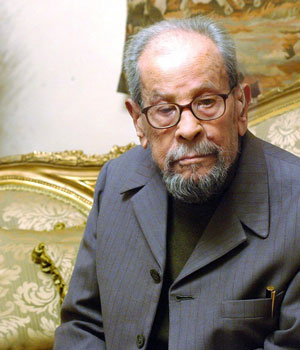
An undated file picture shows Naguib Mahfouz Egyptian novelist and Nobel laureate who died on Wednesday, 30 August 2006 (EPA)
CAIRO, Egypt (AP) – The country’s leading Muslim clerics led mourners in special prayers Thursday for Egypt’s Nobel Prize-winning author Naguib Mahfouz, who was reviled in life for novels condemned by some Islamists as sacrilege.
President Hosni Mubarak was expected to join a military funeral for Mahfouz at another mosque in Cairo’s Nasr City neighborhood later in the day. Mahfouz, the only Arab to have won a Nobel Prize for literature, died Wednesday at age 94.
Mahfouz’s coffin, wrapped in green shroud with the words “there is no god but God” in white letters, was driven to the Hussein mosque, accompanied with a crowd of the author’s friends and admirers who chanted “to eternal Heaven, Naguib.”
“With the clear faith we see between the lines of Mahfouz books. He managed to reach all hearts in the world, not only Arabs or Muslims,” said Ali Gomaa, Egypt’s Grand Mufti as he spoke before the coffin.
Mahfouz stirred controversy among conservatives with his calls for religious tolerance. In 1994, an Islamic militant stabbed him after accusing him of blasphemy because of one his novels, “Children of Gebelaya,” a religious allegory that depicted Islam’s prophet, Muhammad.
During Thursday’s prayer service, a reporter asked Gomaa whether it was appropriate to pray before the body of Mahfouz, seen by Islamic extremists as an atheist. “These are myths,” Gomaa replied. “We want to prove the opposite.”
Also joining in the service was Mohammed Sayed Tantawi, the grand sheik at Al-Azhar University, Sunni Islam’s most important seat of learning. The presence of the two leading clerics was seen as an attempt to rebut allegations that Mahfouz was not a devout Muslim.
Mahfouz was stabbed by a militant upon a fatwa issued in 1989 by Egyptian radical Sheik Omar Abdel-Rahman, later convicted of plotting to blow up New York City landmarks, in which he said that Mahfouz deserved to die for his novel.
The 1959 ‘Children of Gebelawi,’ or ‘Children of Our Alley’ by its Arabic title, told the story of a family patriarch and his sons, who represent the series of prophets that Islam believes includes Jesus and Moses and culminates in Muhammad.
Islam frowns on any literary depiction of Muhammad, except for a straightforward biography. But even more rankling to conservatives was that Mahfouz added a final son who represented science, suggesting he was a prophet after Muhammad.
In a sign of hostility toward the author, an Islamist Web site posted a Web page that mockingly offered condolences for Mahfouz’s death.
“To hell and we pray to God to give him the worst punishment…to be thrown in the deepest parts of hell,” it said.
The Nobel prize, which he won in 1988, introduced to the world a man seen by many as the Middle East’s greatest writer, with 34 novels, hundreds of short stories and essays, dozens of movie scripts and five plays over a 70-year career.
Mahfouz’s novels depicted modern life in his beloved neighborhood of Islamic Cairo, a teeming district of millennium-old mosques and winding alleyways.
Mahfouz, in his will, wanted his funeral to stop first by Hussein Shrine, located at the heart of Islamic Cairo, and few meters from his birth place of Gamaliya district. It is the mosque where his mother used to take him as a child to pray.
The mosque, built in 1154, is believed to contain the head of one of Muhammad’s grandsons, killed in a 7th century battle for leadership of the Islamic faith.

Sheikh Mohammed Tantawi (R) and other dignitaries pray over the coffin of Nobel prize laureate Naguib Mahfouz in the Al Hussein Mosque in the Islamic district of Cairo, 31 August 2006 (EPA)

A mourner holds a newspaper showing a photograph of Egyptian novelist and Nobel laureate Naguib Mahfouz, who died Aug. 30, 2006, at a funeral prayer ceremony held at the al-Hussein Mosque in Cairo, Egypt, Aug. 31, 2006.
